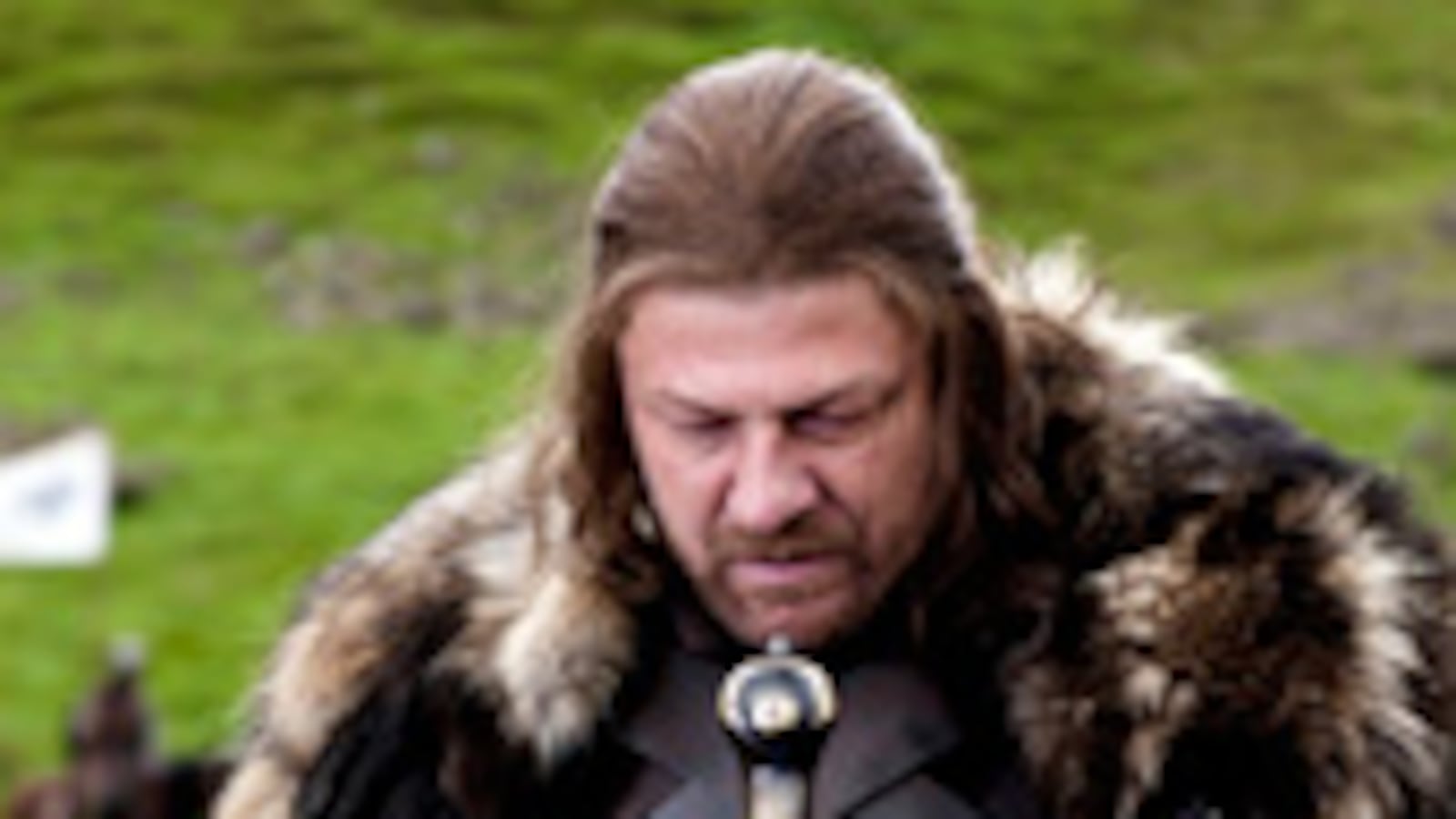HBO is about to unveil an ambitious adaptation of George R.R. Martin's fantasy novel Game of Thrones. Jace Lacob speaks to Martin; the show's creators, David Benioff and D.B. Weiss; and Sue Naegle, the entertainment president of HBO about the ruthlessly addictive show. Fans of the books should also read " 10 Secrets of HBO's Game of Thrones," to find out about casting direwolves, forging the Iron Throne, creating the Dothraki language, and many other behind-the-scenes details. Also, read George R.R. Martin's Curator features of his favorite science fiction films and his favorite fantasy films.
HBO has already successfully tackled vampires in True Blood, the wildly popular adaptation of Charlaine Harris' Sookie Stackhouse novels. Now, the channel is about to tap into the obsessive fanbase of another cult author, plunging into George R.R. Martin's A Song of Ice and Fire fantasy novels with its latest project, Game of Thrones, launching April 17.
Watch the 15-Minute Preview of Game of Thrones
Game of Thrones' breakneck plot revolves around the power plays of various high lords and ladies plotting for control of the feudal society in the Seven Kingdoms of Westeros, where magic has (supposedly) died out and winter can last for decades. In the world of Game of Thrones, you are either a player or a piece in a struggle for power.
The result can best be described as Lord of the Rings crossed with The Sopranos, with a dash of the period drama elements of Rome and the sprawling narrative of The Wire. But even that's too reductive for a series that relishes the gamesmanship, intrigue, and corruption that follows in their wake.
"Like much fantasy, it's concerned with the battle of good versus evil, but where I think I differ from a lot of other fantasists is, in my view, the battle between good and evil is waged every day within the individual human heart," said Martin, speaking to The Daily Beast from his home in Santa Fe, where he's writing the series' fifth volume, A Dance With Dragons, scheduled to be out in July after several delays. "All of us have the capacity for good and all of us have the capacity for evil; it's a question of the decisions we make… I like to paint in shades of gray and to try to reflect, even in a fantasy context, some of the complexities of real life."
With a tremendous cast that includes Sean Bean ( Lord of the Rings), Peter Dinklage ( The Station Agent), and Lena Headey ( Terminator: The Sarah Connor Chronicles), this dark fantasy drama—sexually explicit and morally ambiguous—seems perfectly suited for the premium cable network, which is home to prestige shows like Boardwalk Empire and populist fare like True Blood. The expensive Boardwalk Empire—the pilot of which alone reportedly cost $18 million—has averaged 10.5 million cumulative viewers per episode, across all platforms, which is sizeable, but not quite in the same league as The Sopranos was in its heyday. (The supernatural True Blood has emerged as its biggest audience hit since The Sopranos.) While the budget for Game of Thrones was once rumored to be in the neighborhood of $45 million for its 10-episode first season, that does seem a low number for such a visually stunning project, and fails to take into account the cost of the original pilot, the Malta-based unit, as well as tax incentives, among other factors. (HBO would not comment on the budget.) Regardless, there’s quite a lot riding on the success of the series for HBO, the pay cable network known for its willingness to take risks with its programming.
"We should be known for making good television," said Sue Naegle, HBO's president of entertainment. "The kind of television that's worth paying for: high production values, smart stories, great acting. But we shouldn't only be doing shows that fit into certain boxes… I didn't think, wow, we've just done True Blood, I wonder if we can go and do a fantasy show."
For Martin, who began working on the first novel back in 1991, HBO was the only logical choice for an adaptation this ambitious and vast: The show has its own specially-created language, massive sets in Northern Ireland and Malta, and a dizzying number of characters. His trepidation about going ahead with the adaptation was allayed by executive producers David Benioff and D.B. Weiss (known as Dan), who were fans in their own right of the novels. (They came from "a place of true fandom," said Naegle. "They know it backwards and forwards.")
"I had other meetings prior to David and Dan and some phone conversations with producers, screenwriters, and studio representatives who wanted to do [all seven volumes] as one movie," said Martin. "I didn't know what they were smoking."
The complexity and length of each of Martin's novels ( A Storm of Swords, the longest to date, clocks in at an astonishing 924 pages in its latest paperback edition) makes it extremely difficult to shoehorn in the whiplash-inducing plot twists and relentless pacing. The first book will be adapted as Season 1 of Game of Thrones and the idea—for now—is that each subsequent book will provide the narrative spine for its own season.
Talk to Weiss and Benioff and what's immediately noticeable is not only the reverence they have for Martin's underlying work but also the passion they brought to the table and a fan's need to get it right as much as they could. "It's a massive world that George has created and we're trying to be very faithful to that world, and we're trying to recreate it on-screen," said Benioff. "It's difficult to do with a feature budget; it's really difficult to do, even with a generous TV budget."
"Our mantra throughout was always, this is a real world," Weiss said. "It's not our world, but it's a real world. People live in this world. It's not a fantasy world. It's not a science-fiction world. This is their planet and it's just as real to them as our world is to us."
That correlates with some of the real-life crossover between the novels' themes of war and peace, love and hate, winter and summer. Martin's novels, however, do not have a simplistic worldview, according to the producers.
"Good people suffer, bad people suffer, and ultimately everyone suffers," Benioff said. "Shit happens. I love at times the almost random brutality of the way things play out. You never know if characters are ever safe."
But putting aside the philosophical perspective, Game of Thrones also offers an adrenaline rush of plots, double-crosses, and jaw-dropping revelations. With a sprawling cast that features no fewer than 18 series regulars and hundreds of minor characters, are Weiss and Benioff concerned at all about information overload?
"There is just a lot of trust you have to place into your audience that they're going to be able to keep up at a certain point," said Weiss. "We believe in the intelligence of George's audience and the intelligence of the audience from the series."
So does HBO, which launched a massive promotional campaign behind the show, bringing the food of the novels' primary setting, the Seven Kingdoms of Westeros, to New York and Los Angeles via celebrity chef Tom Colicchio-run food trucks and teasing the audience with previews, trailers, websites, and behind-the-scenes material. It's clear that HBO has great expectations for how well it will do, ratings-wise.
"The show delivers in performance and in production," said Naegle. "There is nothing formulaic about it. It is a completely unexpected political fantasy. Those kinds of shows do well with an audience. We're hopeful that this is going to be a show that men can watch, that women can watch. You always want that… Our expectations are high."
The show's audience will undoubtedly include both those unfamiliar with Martin's A Song of Ice and Fire as well as the fans who are obsessed with the massive set of tomes in the series. A Hollywood veteran who worked on Beauty and the Beast and written several original pilots, Martin is writing A Dance With Dragons, the fifth installment in the seven-book series (which, to date, has sold 7 million copies worldwide), whose release has been delayed approximately six years. Martin himself has been compared to Lord of the Rings author J.R.R. Tolkien, a comparison Martin wears with pride.
"I am very flattered to be called the American Tolkien," said Martin, who, in the flesh, resembles a hippie Santa, and is often seen wearing a newsboy cap and suspenders. "I admire Tolkien vastly… Modern fantasy would not exist if not for him. All of us who follow him are, in a sense, writing in his shadow."
"That said, I am very different from Tolkien," said Martin, a lapsed Catholic from Bayonne, New Jersey, who was a conscientious objector to the Vietnam War. "We're both working in the tradition of epic fantasy, but we're doing very different things with it."
Despite the accolades he's received and the faith he has in the producers and HBO, Martin admitted to feeling some "separation anxiety" when it came to turning over his characters to others.
"I think when you hand your baby off to someone, whether you're a parent taking your kid to school or a writer handing his literary work to someone else to adapt, you have to be prepared that it's not going to be the same as if you did it yourself," he said. "There are going to be differences. They are going to teach your kids things that you might not have ever taught them."
Jace Lacob is The Daily Beast's TV Columnist. As a freelance writer, he has written for the Los Angeles Times, TV Week, and others. Jace is the founder of television criticism and analysis website Televisionary and can be found on Twitter. He is a member of the Television Critics Association.






